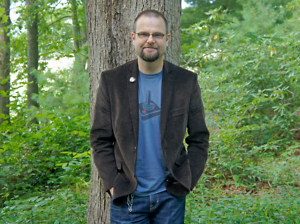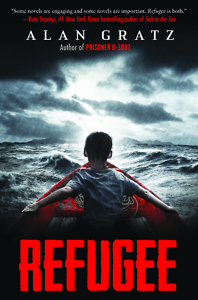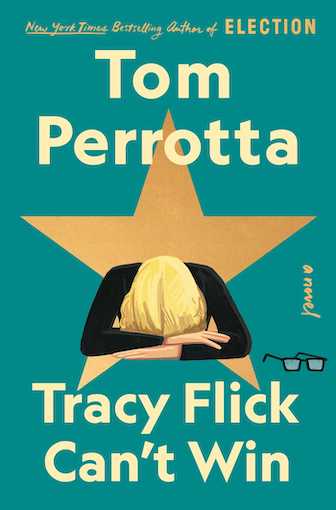See Us. Hear Us. Help Us.
In his new middle-grade novel, Alan Gratz illuminates the universal plight of refugees
It will be difficult for any reader to sit on a comfortable couch in a comfortable home and absorb Alan Gratz’s new middle-grade novel, Refugee, without feeling both an overwhelming sense of grief and a deep desire to change the world. What Gratz has done is no small feat—distilling the horrors of Nazi Germany, Castro’s Cuba, and the Syrian refugee crisis into a beautifully written, heart-wrenching balancing act between three pre-teen protagonists separated by decades but united by courage. Refugee is sure to win awards and be taught in classrooms and—as great stories always do—maybe even change a heart or two.
 Twelve-year-old Josef Landau’s tale begins in Berlin in 1938. Josef’s family is Jewish. His father is arrested on Kristallnacht, along with tens of thousands of others, and sent to the concentration camp at Dachau. Six months later, he is released and told to leave Germany within two weeks. The family eventually secures passage to Cuba, where they believe asylum awaits. On board the ship, Josef reflects on the crew’s ignorance of the refugees’ predicament: “The stewards smiled with the passengers as though they understood, but none of them could really understand, Josef thought. Not until their shop windows had been smashed and their businesses had been shut down. Not until the newspapers and radio talked about them as subhuman monsters. Not until shadowy men had burst into their homes and smashed up their things and dragged away someone they loved. Not until they had been told to leave their homeland and never, ever come back.”
Twelve-year-old Josef Landau’s tale begins in Berlin in 1938. Josef’s family is Jewish. His father is arrested on Kristallnacht, along with tens of thousands of others, and sent to the concentration camp at Dachau. Six months later, he is released and told to leave Germany within two weeks. The family eventually secures passage to Cuba, where they believe asylum awaits. On board the ship, Josef reflects on the crew’s ignorance of the refugees’ predicament: “The stewards smiled with the passengers as though they understood, but none of them could really understand, Josef thought. Not until their shop windows had been smashed and their businesses had been shut down. Not until the newspapers and radio talked about them as subhuman monsters. Not until shadowy men had burst into their homes and smashed up their things and dragged away someone they loved. Not until they had been told to leave their homeland and never, ever come back.”
Isabel Fernandez is eleven years old in 1994 and lives near Havana with her parents and her beloved grandfather. Starvation threatens, but Fidel Castro suddenly reverses his long-held and brutally enforced position on emigration. Isabel and her family and their neighbors seize the opportunity, gather their meager provisions, and set sail for Miami in a homemade raft. When a friend is killed during their journey, Isabel struggles with her grief: “She wished she was dead too. She wished she was dead so they would put her into the water with him. So she could keep him company in the deep.”
 Twelve-year-old Mahmoud Bishara lives in Aleppo, Syria, with his little brother, baby sister, and parents. The year is 2015, and Aleppo has become the center of a violent war of ideologies: Sunni against Shia, government against rebels, Soviets against the U.S., and all while ISIS is fighting an apocalyptic holy war all its own. When asked whose side they support, Mahmoud’s little brother answers honestly: “We’re against whoever is dropping the bombs on us.” When one of those bombs destroys their apartment building, Mahmoud and his family flee toward Germany.
Twelve-year-old Mahmoud Bishara lives in Aleppo, Syria, with his little brother, baby sister, and parents. The year is 2015, and Aleppo has become the center of a violent war of ideologies: Sunni against Shia, government against rebels, Soviets against the U.S., and all while ISIS is fighting an apocalyptic holy war all its own. When asked whose side they support, Mahmoud’s little brother answers honestly: “We’re against whoever is dropping the bombs on us.” When one of those bombs destroys their apartment building, Mahmoud and his family flee toward Germany.
After watching the way others react to his family and their desperate struggle, Mahmoud suddenly understands: “They only see us when we do something they don’t want us to do, Mahmoud realized. The thought hit him like a lightning bolt. When they stayed where they were supposed to be—in the ruins of Aleppo or behind the fences of a refugee camp—people could forget about them. But when refugees did something they didn’t want them to do—when they tried to cross the border into their country, or slept on the front stoops of their shops, or jumped in front of their cars, or prayed on the decks of their ferries—that’s when people couldn’t ignore them any longer.”
The stories are set in different times and places, but they share the same challenges: hunger and homelessness, injustice and cruelty, shocking violence and brutal death. In each case these characters display an unwavering belief that family and love and decency must somehow triumph over evil. Josef, Isabel, and Mahmoud share a fierce certainty that they must protect their loved ones, and as a result they make sacrifices and display maturity beyond their years. Josef makes painful decisions as the head of his family when his father becomes incapacitated by mental illness. A talented musician with a deep love for the rhythms of her homeland, Isabel sells her beloved trumpet to purchase gasoline for the raft. Mahmoud finds the courage to shed the “invisibility” he has cultivated and lead his family to a better future.
With this novel, Gratz, a former Knoxvillian, has written a sobering meditation on what it means to be a refugee, no matter when or where. Gratz intends to donate a portion of the proceeds from the sale of Refugee to UNICEF. In his introduction, he writes, “I hope this novel will help readers understand that caring for others transcends religions, borders, and beliefs, and is the job of us all.” In the end, Mahmoud wills the world to pay attention, to bear witness: “See us, he thought. Hear us. Help us.”

A graduate of Auburn University, Tina Chambers has worked as a technical editor at an engineering firm and as an editorial assistant at Peachtree Publishers, where she worked on books by Erskine Caldwell, Will Campbell, and Ferrol Sams, to name a few. She lives in Chattanooga.


